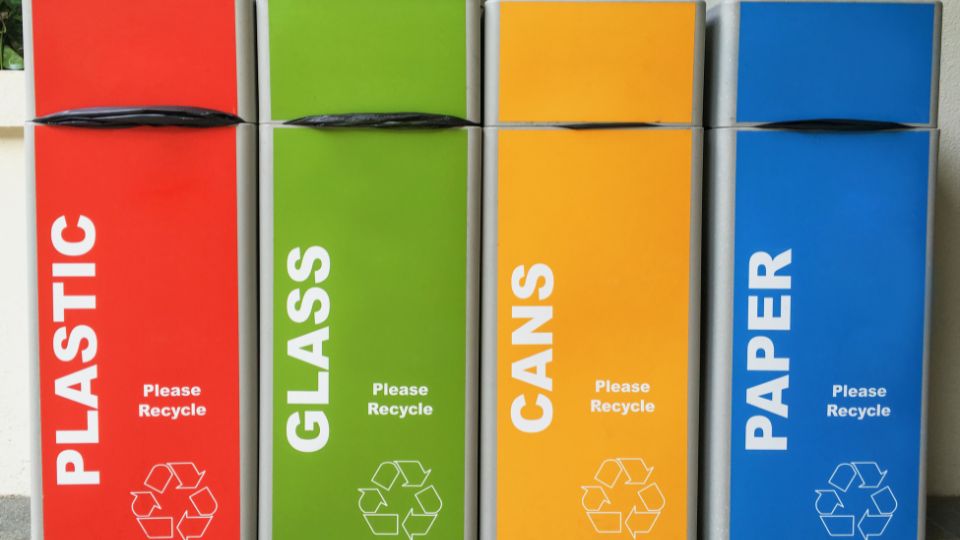What is the New Recycling Policy?
The new regulations will require all workplaces to separate recyclable materials in the same way that most householders do now.
Gone are the days of putting everything in the general waste bin or all your recycling in a mixed recycling bin. Now, you have to separate your discarded materials into individual containers.
Who Will Be Affected?
These regulations will apply to:
- All workplaces, including businesses, public sector organisations, and charities.
- Waste collectors and processors who handle household-like waste from workplaces.
What Materials Need to Be Separated and Collected?
Workplaces are required to separate and collect the following materials:
- Food waste for premises producing more than 5kg of food waste weekly.
- Paper and card.
- Metal, plastic, cartons, and similar packaging materials.
- Unsold small waste electrical and electronic equipment (WEEE).
- Unsold textiles.
Putting these materials in a single waste bin is not allowed. Each category must be kept separate from the others.
What Forms of Waste Disposal Are Banned?
The new regulations also introduce bans on:
- Sending food waste to sewers.
- Sending separately collected waste to incineration or landfills (with exceptions for most textiles, excluding unsold textiles).
- Sending wood waste to landfills.
Special Rules for Food Waste
For premises producing more than 5kg of food waste weekly, the new regulations require the separation and recycling of food waste.
This applies to establishments such as hotels, restaurants, cafes, canteens, and more.
Food waste should not be disposed of in general waste, landfill, sewers, and macerators (or similar technologies) for disposing of food waste are not allowed.
How Will it be Enforced and What are the Penalties
Enforcement of these regulations will be overseen by Natural Resources Wales (NRW), which will ensure correct separation and collection of materials and compliance with the bans on incineration and landfill.
Local authorities will oversee the ban on food waste going to sewers.
Non-compliance with the law could result in fines for workplaces.
Responsibility for Compliance
It is the responsibility of all workplaces in Wales to follow the new law, whether they own, lease, rent, or temporarily occupy the premises.
The occupiers of workplaces must ensure the proper separation of recyclable materials for collection.
In cases of shared locations with multiple workplaces, each organisation is individually responsible but may need to coordinate with the landlord or facilities manager for a central recycling system.
How Your Business Can Prepare
The new regulations will become effective on 6 April 2024. To prepare, consider the following actions:
- Engage with your recycling and waste collector to ensure they can collect separated recycling.
- Examine the waste generation in your workplace and identify opportunities for waste reduction and reuse.
- Evaluate the types and quantities of recycling containers needed both indoors and outdoors.
- Educate and inform your staff about the new law and encourage their cooperation.
- Ensure accessible recycling bins for all customers and staff.
- Prioritise staff health and safety regarding waste storage and handling.
- Understand the “Duty of Care” regulations regarding waste management.
What Do We Recommend?
We highly recommend that Welsh businesses use a commercial bag (waste sack) collection service for each type of recyclable waste so that they don’t have to have 7 wheelie bins on their premises.
We provide 50L bin bags for each waste type and can collect these waste sacks for you rather than having to provide larger containers.
We also offer 120L wheelie bins for Welsh businesses which are about half the size of a regular household wheelie bin.
These options will be the most effective way of managing the change in legislation with the least disruption to your business.
Further Support and Guidance
The Waste and Resources Action Programme (WRAP) and the Welsh Government will provide additional information and resources to help workplaces prepare for the changes.
This support includes examples from other workplaces, guides for specific sectors, webinars, and downloadable communication resources like bin signs and posters.
For More Information
For more detailed information about the changes, consult the draft Code of Practice on the Separate Collection of Waste Materials for Recycling.
By implementing these regulations, Wales aims to increase recycling, reduce carbon emissions, and build a greener and more sustainable future for the country.
But, at Waste Managed, we recognise how much strain this will bring onto Welsh businesses.
If you need some advice on your best options then get a quote with our team today and we’ll be in touch with a friendly, expert advisor.

